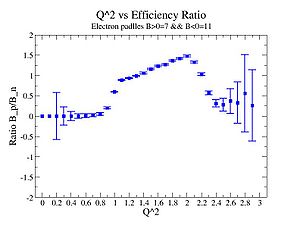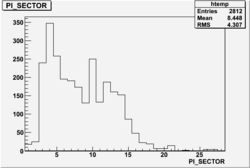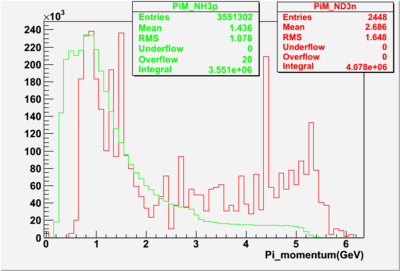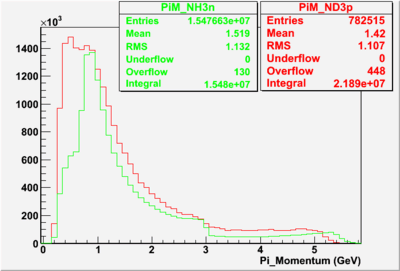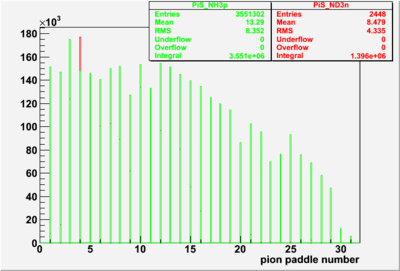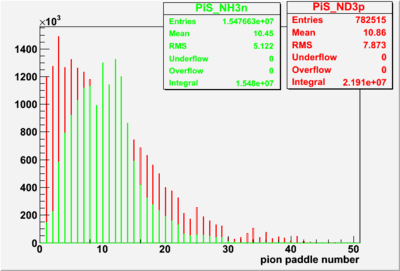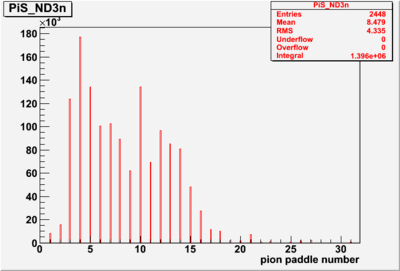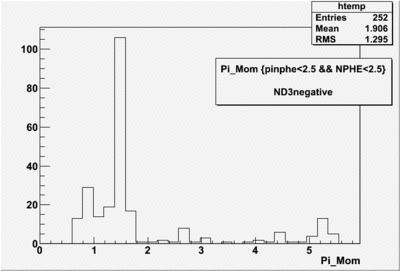Difference between revisions of "TD Ddoverd 2010"
(Created page with '= 2/10/2010= {| border="1" |cellpadding="20" cellspacing="0 |- | root file || reaction || <math>Q^2</math> || W vs <math>Q^2</math> || <math>F_{cup}</math> || <math>X_b</mat…') |
|||
| Line 549: | Line 549: | ||
[[File:ND3npaddlenumberwithnphecuts.gif|400px]]<br> | [[File:ND3npaddlenumberwithnphecuts.gif|400px]]<br> | ||
| + | |||
| + | [[DeltaDoverD_Progress]] | ||
Latest revision as of 18:20, 6 February 2011
2/10/2010
| root file | reaction | W vs | # events for <1.232 | ||||
| 1 | B<0, pi^-=27 && e^-=11 | 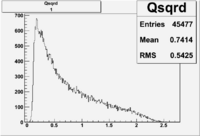 |
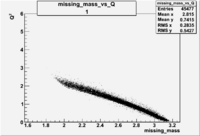 |
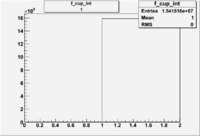 |
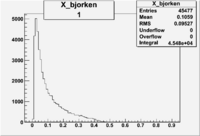 |
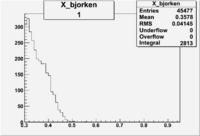 |
9868 |
| 2 | B>0, pi^+=27 && e^-=11 | 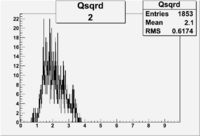 |
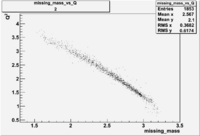 |
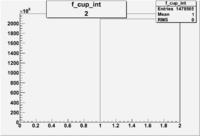 |
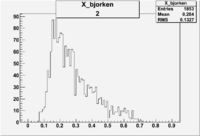 |
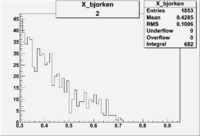 |
412 |
| 3 | B>0, pi^+=27 && e^-=7 | 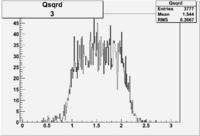 |
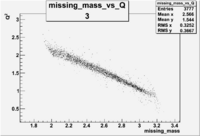 |
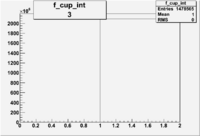 |
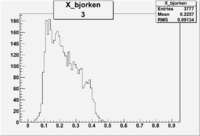 |
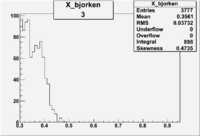 |
793 |
| 4 | B>0, pi^-=7 && e^-=11 | 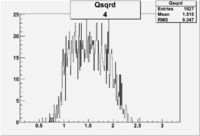 |
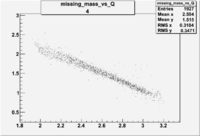 |
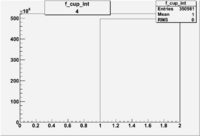 |
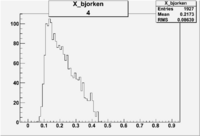 |
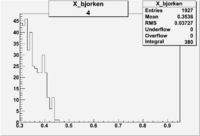 |
400 |
| 5 | B<0, pi^+=7 && e-=11 | 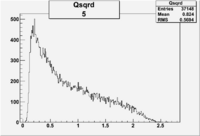 |
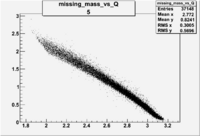 |
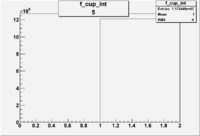 |
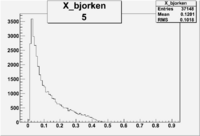 |
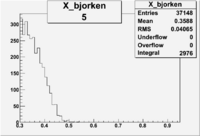 |
9406 |
Rate differences
Which paddle do we expect the Pion to hit if we flip the direction of the B-Field?
Only using Certain Paddles
or
Looking at Ratio_3 and Ratio_4 one can make a conclusion that we are detecting ~% more type hadrons.
Choosing events Below 1.232 GeV && Certain paddle numbers
22-02-2010
- NH3 Target, two file lists: NH3Bn.list (B<0, 26994-26983) && NH3Bp.list (B>0, 27074-27079)
no paddle cuts
- A.) B>0
1.) B>0, && , NH3Bp1_1.root
2.) B>0, && , NH3Bp2_1.root
- B.) B<0
1.) B<0, && , NH3Bn1_1.root
2.) B<0, && , NH3Bn2_1.root
Paddle Cuts
Again, choosing events below 1.232 GeV, applying cuts, and plotting Histograms for certain electron and pion paddles.
_vs_, , Fcup && .
- A.) B>0
1.) B>0, && , NH3Bp1.root
2.) B>0, && , NH3Bp2.root
- B.) B<0
1.) B<0, && , NH3Bn1.root
2.) B<0, && , NH3Bn2.root
| File | W vs | |||
| NH3Bp1.root | 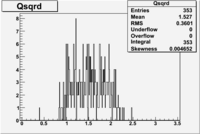 |
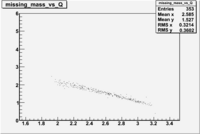 |
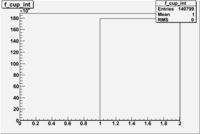 |
200px |
| NH3Bp2.root | 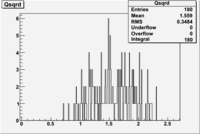 |
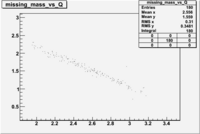 |
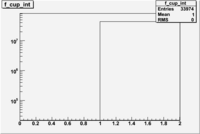 |
200px |
| NH3Bn1.root | 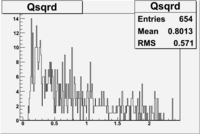 |
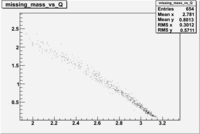 |
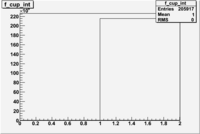 |
200px |
| NH3Bn2.root | 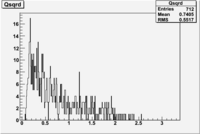 |
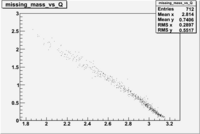 |
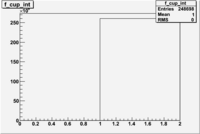 |
200px |
Now you need to cut on . The above suggests that looking at 1 < < 2 GeV/c^2 may be a good starting point.
The idea is to compare the outbending (B<0) rate in paddle 27 to the inbending(B>0) rate in paddle 7 when 1 < < 2. For the same kinematics the rates should be the same because the reaction is the same. Do the same for to see if it is consistent. This will show much flipping the magnet polarity impacts the rate measurement. Are the differences due to the B-field change or the scintillator efficiency, or to the track reconstruction? Our goal is to argue that the detector has the same efficiency for detecting and in the same scintillator when the Torus B-field direction is flipped.
1 < < 2
| File | W vs | ||
| NH3Bp1.root | 200px | 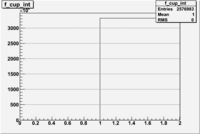 |
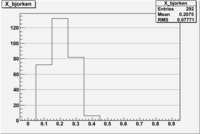
|
| NH3Bp2.root | 200px | 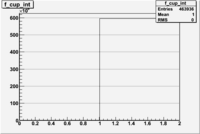 |
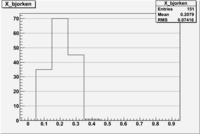
|
| NH3Bn1.root | 200px | 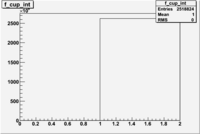 |
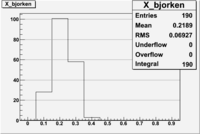
|
| NH3Bn2.root | 200px | 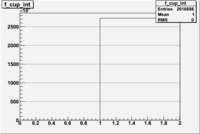 |
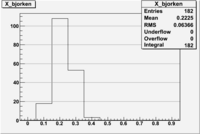
|
| bin | Bp1/Bn1 | Bp2/Bn2 |
| 0.1 | 2.38 0.299 | 1.09 0.405 |
| 0.2 | 1.29 0.188 | 3.59 0.215 |
| 0.3 | 1.38 0.242 | 4.6 0.284 |
| 0.4 | 1.62 1.02 | 3.76 1.28 |
Angle vs Paddle Number Distribution
| # | angle vs paddle number | angle vs paddle number |
| B>0, && | 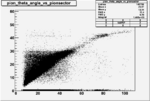 |
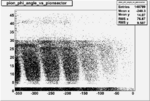
|
| B>0, && | 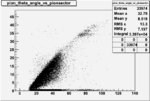 |
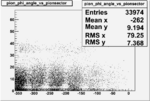
|
| B<0, && | 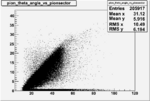 |
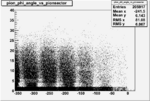
|
| B<0, && | 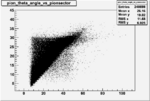 |
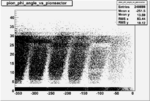
|
26/04/2010
NH3Bn positive pion runs
7.root - 27.root
| pion paddle number | x_bj=0.1 | x_bj=0.2 | x_bj=0.3 | x_bj=0.4 |
| 1 | 10 3.16 | 38 6.16 | 20 4.47 | 2 1.4 |
| 2 | 14 3.7 | 60 7.7 | 28 5.3 | 0 |
| 3 | 20 4.5 | 93 9.6 | 48 6.9 | 3 1.7 |
| 4 | 26 5.1 | 87 9.3 | 53 7.3 | 5 2.2 |
| 5 | 24 4.9 | 94 9.7 | 42 6.5 | 6 2.4 |
| 6 | 30 5.5 | 125 1.1 | 79 8.9 | 7 2.6 |
| 8 | 16 4 | 102 10 | 65 8.1 | 4 2 |
| 9 | 19 4.3 | 96 9.8 | 48 6.9 | 3 1.7 |
| 10 | 23 4.8 | 98 9.9 | 57 7.5 | 2 1.4 |
| 11 | 16 4 | 71 8.4 | 38 6.2 | 2 1.4 |
| 12 | 20 4.5 | 85 9.2 | 53 7.3 | 6 2.5 |
| 13 | 13 3.6 | 73 8.5 | 42 6.5 | 5 2.2 |
| 14 | 19 4.3 | 75 8.7 | 38 6.2 | 3 1.7 |
| 15 | 15 3.9 | 62 7.9 | 25 5 | 2 1.4 |
| 16 | 22 4.7 | 58 7.6 | 42 6.5 | 0 |
| 17 | 5 2.2 | 40 6.3 | 23 4.8 | 4 2 |
| 18 | 10 3.2 | 33 5.7 | 18 4.2 | 2 1.4 |
| 19 | 7 2.6 | 27 5.2 | 21 4.5 | 1 1 |
| 20 | 3 1.7 | 34 5.8 | 13 3.6 | 0 |
| 21 | 3 1.7 | 16 4 | 9 3 | 0 |
| 22 | 2 1.4 | 10 3.2 | 2 1.4 | 0 |
| 23 | 0 | 2 1.4 | 3 1.7 | 1 1 |
| 24 | 0 | 1 1 | 1 1 | 0 |
NH3Bp positive pion runs
#p.root
| pion paddle number | x_bj=0.1 | x_bj=0.2 | x_bj=0.3 | x_bj=0.4 |
| 4 | 21 4.6 | 15 3.9 | 2 | |
| 5 | 39 | 58 | 18 | |
| 6 | 56 | 91 | 49 | |
| 7 | 90 | 110 | 82 | 5 |
| 8 | 81 | 155 | 78 | 3 |
| 9 | 68 8.1 | 139 12 | 85 9.2 | 4 2 |
| 10 | 83 9.1 | 181 13 | 88 9.4 | 8 2.8 |
| 11 | 102 10 | 164 13 | 96 9.8 | 8 2.8 |
| 12 | 103 10.1 | 188 13.7 | 122 11 | 8 2.8 |
| 13 | 85 9.2 | 203 14.2 | 132 11.5 | 16 4 |
| 14 | 105 10.2 | 219 14.8 | 120 10.9 | 11 3.3 |
| 15 | 116 10.8 | 192 13.8 | 113 10.6 | 8 2.8 |
| 16 | 91 9.5 | 208 14.4 | 134 11.6 | 9 3 |
| 17 | 98 9.9 | 187 13.7 | 112 10.6 | 9 3 |
| 18 | 106 10.3 | 159 12.6 | 121 11 | 7 2.6 |
| 19 | 91 9.5 | 166 12.9 | 107 10.3 | 9 3 |
| 20 | 83 9.1 | 138 11.7 | 90 9.5 | 7 2.6 |
| 21 | 81 9 | 167 12.9 | 110 10.5 | 11 3.3 |
| 22 | 87 9.3 | 164 12.8 | 84 9.2 | 5 2.2 |
| 23 | 77 8.8 | 98 9.9 | 73 8.5 | 6 2.4 |
| 24 | 86 9.3 | 131 11.4 | 81 9 | 6 2.4 |
| 25 | 96 9.8 | 185 13.6 | 92 9.6 | 14 3.7 |
| 26 | 87 9.3 | 147 12.1 | 97 9.8 | 8 2.8 |
| 27 | 72 8.5 | 132 11.5 | 82 9.1 | 6 2.4 |
| 28 | 64 8 | 131 11.4 | 73 8.5 | 10 3.2 |
| 29 | 46 6.9 | 101 10 | 53 7.5 | 2 1 |
| 30 | 13 3.5 | 14 3.8 | 18 4.8 | 1 1 |
06-02-2010
Electron Efficiency
Chosen electron paddles are following for the positive and negative paddles respectively: 7 and 11.
electroneffbp.root && electroneffbn.root
B>0
TH1.Print Name = Qsqrd, Entries= 323638, Total sum= 323634 fSumw[0]=0, x=-0.2 fSumw[1]=0, x=-0.1 fSumw[2]=0, x=9.71039e-18 fSumw[3]=0, x=0.1 fSumw[4]=3, x=0.2 fSumw[5]=21, x=0.3 fSumw[6]=93, x=0.4 fSumw[7]=285, x=0.5 fSumw[8]=575, x=0.6 fSumw[9]=1148, x=0.7 fSumw[10]=2478, x=0.8 fSumw[11]=9402, x=0.9 fSumw[12]=24380, x=1 fSumw[13]=31648, x=1.1 fSumw[14]=29967, x=1.2 fSumw[15]=27864, x=1.3 fSumw[16]=27157, x=1.4 fSumw[17]=26820, x=1.5 fSumw[18]=25603, x=1.6 fSumw[19]=25027, x=1.7 fSumw[20]=24470, x=1.8 fSumw[21]=23512, x=1.9 fSumw[22]=20320, x=2 fSumw[23]=13453, x=2.1 fSumw[24]=6738, x=2.2 fSumw[25]=2043, x=2.3 fSumw[26]=449, x=2.4 fSumw[27]=119, x=2.5 fSumw[28]=41, x=2.6 fSumw[29]=13, x=2.7 fSumw[30]=5, x=2.8 fSumw[31]=4, x=2.9
B<0
TH1.Print Name = Qsqrd, Entries= 716018, Total sum= 716011
fSumw[0]=0, x=-0.2 fSumw[1]=0, x=-0.1 fSumw[2]=180, x=9.71039e-18 fSumw[3]=112762, x=0.1 fSumw[4]=160348, x=0.2 fSumw[5]=91665, x=0.3 fSumw[6]=62692, x=0.4 fSumw[7]=46135, x=0.5 fSumw[8]=35169, x=0.6 fSumw[9]=28473, x=0.7 fSumw[10]=23810, x=0.8 fSumw[11]=20763, x=0.9 fSumw[12]=18452, x=1 fSumw[13]=16021, x=1.1 fSumw[14]=14494, x=1.2 fSumw[15]=12731, x=1.3 fSumw[16]=11610, x=1.4 fSumw[17]=10422, x=1.5 fSumw[18]=9437, x=1.6 fSumw[19]=8929, x=1.7 fSumw[20]=8149, x=1.8 fSumw[21]=7504, x=1.9 fSumw[22]=6209, x=2 fSumw[23]=4557, x=2.1 fSumw[24]=2948, x=2.2 fSumw[25]=1625, x=2.3 fSumw[26]=659, x=2.4 fSumw[27]=195, x=2.5 fSumw[28]=50, x=2.6 fSumw[29]=18, x=2.7 fSumw[30]=4, x=2.8 fSumw[31]=7, x=2.9
Electron Eff Result
| Inclusive detected electrons -vs- Q-squared | Inclusive Missing Mass (W) for 1.0 Q^2 <1.2 |
Media:electronefficiencyratioBp7Bn11.txt
Now plot efficiency as function of X_{BJ} and W < 1232 and require pion.
Positive Pion Efficiency dependence on
Pion and electron both required.
W<1232 and
Now cut on Q^2 where the inclusive electron rates are the same with both torus settings and then require at least one positive pion.
| X_bj | B_n/B_p Rates |
|---|---|
| 0.14 | 0.25 0.55 |
| 0.15 | 0.74 0.27 |
| 0.17 | 1.07 0.18 |
| 0.19 | 1.3 0.13 |
| 0.2 | 1.4 0.14 |
There appears to be a region around X_{Bj}= 0.2 which has the same number of pions detected for both torus settings.
Negative Pion Efficiency dependence on
Pion and electron both required(e_sector=7 for B>0 && e_sector=11 for B<11).
Now cut on Q^2 where the inclusive electron rates are the same with both torus settings and then require at least one positive pion.
| B_p/B_n Rates | |
|---|---|
| 0.2 | 0.004 0.55 |
| 0.3 | 0.017 0.5 |
| 0.4 | 0.069 0.6 |
| 0.5 | 0.0262 0.6 |
| 0.6 | 0.039 0.5 |
| 0.7 | 0.1 0.64 |
| 0.8 | 0.055 0.52 |
| 0.9 | 0.259 0.52 |
| 1 | 1.232 0.52 |
| 1.1 | 3.96 0.8 |
There DOES NOT appears to be a region which has the same number of negative pions detected for both torus settings.
What is wrong?
8/13/10
1.) Change Osipenko cuts to maximize electrons when B <0 but still minimize impact of negative pion contamination. Look at effects on Npe distribution.
Insert current number of electron events that are removed by the Osipenko cut for B<0. Compare it to event removed by other cuts.
2.) Schedule Prelim exam.
Shropshire has replaced cole.
Members are: Forest, Fisher, Shropshire, Dale, Tatar(?)
Ask Dustin McNulty
1.) [1]
"Original cut parameters generated by Osipenko et.al. were not very efficient for especially outbending data of eg1b experiment. The loss of electrons was substantial. For inbending data, loss of electrons were at acceptable level. To gain some electrons back we generated new cut parametes that will specifically work better for outbending data. Also we slightly adjusted the cut parameters for inbending data for some sectors and segments."
2.) Upgraded Proposal defense presentation(includes event display) File:TamarProposalP 1.pdf
11/10/10
DTS files used for analysis.
Media:ND3Bn.txt
Media:ND3Bp.txt
Media:NH3Bn.txt
Media:NH3Bp.txt
positive
negative
What are the cuts for the above histogram?
pion, OSI, EC
11/30/10
DST ntuple suggestions
- Event number and run number should be recorded. Run number is in RUNINFO. Event number should be in the event packet.
- Create variable called helicity and fill it with absolute helicity.
GEM detector
- order mylar and copper tape., 1" wide, $20 worth of each
- check DPO 4104 see if working properly
- find 10 frames for Qweak GEM foils (or order more)
- check gas supply
12/6/10
DST ntuple
Run number looks good.
PbPt values are all non-zero now.
1) Some of the TORUS values are zero when they should be positive?
Doesnt matter. There are totally four files: ND3_target+Torus_positive, ND3_target+Torus_negative, NH3_target+Torus_positive and NH3_target+Torus_negative. So not an issue.
2.) Electrons have less than 0.25 GeV energy?
Still dont know.
3.) ASYM=HWP*LINAC*P_T is in the root file.
4.) Where are the FC normalization histograms
12/20/10
DST
1.) Looks like a particle ID problem for outbending (B<0) negative pions.
Calculate the missing mass for the and stor it in M_X. (included and corrected in NTUPLE)
Redo all the ntuples.
All ntuples are done.
2.) is run 27048 OK (no target run(empty)), corrected for both target runs
3.) Current quarks(the core of the constituent quark without the gluons and sea quarks(covering). The mass of the current quarks(up and down) is 5-10 MeV), light cone?
pion momentum for different torus settings and targets
pion paddle number for different torus settings
Need a before and after cuts histogram with stats to see number of events dropped
